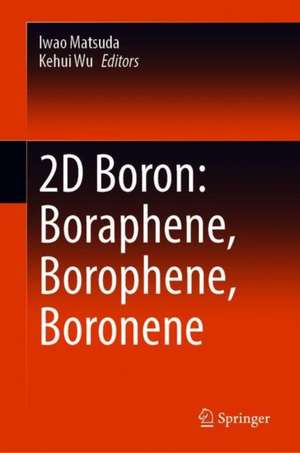2D Boron: Boraphene, Borophene, Boronene
Editat de Iwao Matsuda, Kehui Wuen Limba Engleză Hardback – 19 noi 2020
| Toate formatele și edițiile | Preț | Express |
|---|---|---|
| Paperback (1) | 774.93 lei 38-44 zile | |
| Springer International Publishing – 19 noi 2021 | 774.93 lei 38-44 zile | |
| Hardback (1) | 944.67 lei 6-8 săpt. | |
| Springer International Publishing – 19 noi 2020 | 944.67 lei 6-8 săpt. |
Preț: 944.67 lei
Preț vechi: 1152.04 lei
-18% Nou
Puncte Express: 1417
Preț estimativ în valută:
180.77€ • 189.21$ • 150.45£
180.77€ • 189.21$ • 150.45£
Carte tipărită la comandă
Livrare economică 31 martie-14 aprilie
Preluare comenzi: 021 569.72.76
Specificații
ISBN-13: 9783030499983
ISBN-10: 3030499987
Ilustrații: XI, 160 p. 103 illus., 57 illus. in color.
Dimensiuni: 155 x 235 mm
Greutate: 0.42 kg
Ediția:1st ed. 2021
Editura: Springer International Publishing
Colecția Springer
Locul publicării:Cham, Switzerland
ISBN-10: 3030499987
Ilustrații: XI, 160 p. 103 illus., 57 illus. in color.
Dimensiuni: 155 x 235 mm
Greutate: 0.42 kg
Ediția:1st ed. 2021
Editura: Springer International Publishing
Colecția Springer
Locul publicării:Cham, Switzerland
Cuprins
Chapter 1. A Historical Review of Theoretical Boron Allotropes in Various Dimensions .- Chapter 2. Borophenes: insights and predictions from computational analyses.- Chapter 3. Synthesis of Borophene.- Chapter 4. Electronic Structure of Borophene.- Chapter 5. Chemically Modified Borophene.- Chapter 6. Physical and Chemical Properties of Boron Solids.
Notă biografică
Iwao Matsuda is an associate professor of the Institute for Solid State Physics in the University of Tokyo. He received his Ph.D. from the University of Tokyo, performed his post-doctoral research at the University of Zurich, and then became a research associate at the University of Tokyo. He is the beamline manager at SPring-8 BL07LSU and the Editor-in-Chief of the e-Journal of Surface Science and Nanotechnology. His research includes scientific developments on surfaces and in atomic layers. He is the author of many research papers and the main editor on a book on monatomic two-dimensional layers.
Kehui Wu is a research group leader in the State Key Laboratory for Surface Physics, Institute of Physics, Chinese Academy of Sciences (CAS), and also a professor of University of CAS. He received his Ph.D. degree from the Institute of Physics, CAS in 2000, performed his postdoctoral research at Tohoku University, Japan, and then joined the Institute of Physics, CAS as a professor. His research interests include the growth of low-dimensional materials by molecular beam epitaxy, and atomic level studies by scanning tunneling microscopy/spectroscopy-based techniques. His recent works include experimental discoveries of silicene and 2D boron.
Kehui Wu is a research group leader in the State Key Laboratory for Surface Physics, Institute of Physics, Chinese Academy of Sciences (CAS), and also a professor of University of CAS. He received his Ph.D. degree from the Institute of Physics, CAS in 2000, performed his postdoctoral research at Tohoku University, Japan, and then joined the Institute of Physics, CAS as a professor. His research interests include the growth of low-dimensional materials by molecular beam epitaxy, and atomic level studies by scanning tunneling microscopy/spectroscopy-based techniques. His recent works include experimental discoveries of silicene and 2D boron.
Textul de pe ultima copertă
This book addresses the development, properties, and applications of atomic-layered boron, or, borophene. The authors explain how borophene was predicted and created before investigating the properties that make it a desirable and useful material. The material is extremely thin and possesses exotic quantum states of new Dirac physics. Applications in superconductivity, plasmonics, and industrial chemical catalysis are examined, along with an examination of the material’s unique hydrogen boride and boron nitride forms. Given the varied potential uses for the new-developed borophene, this timely book will be useful to researchers in academia and industry.
- Discusses a new class of two-dimensional materials, borophene, made of well-known boron atoms
- Describes potential applications and innovations in electronics, plasmonics, catalysis or superconductivity
- Examines the historical background and development of borophene
Caracteristici
Discusses a new class of two-dimensional materials, borophene, made of well-known boron atoms Describes potential applications and innovations in electronics, plasmonics, catalysis or superconductivity Examines the historical background and development of borophene
